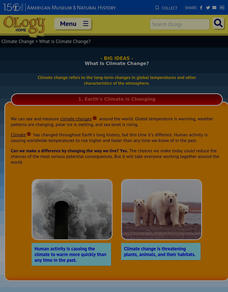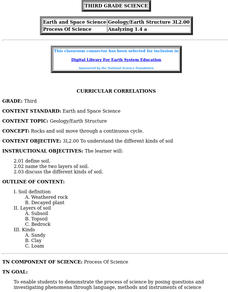American Museum of Natural History
What Is Climate Change?
So many factors show that climate change has arrived. Learners read through an online resource that explains the data and the consequences of climate change. They also review strategies for slowing or even reversing the global influence.
Curated OER
Cloud Poems
First graders make daily observations about clouds, write in their cloud books, make cloud charts, and make a poem about clouds.
Curated OER
Air Pressure is Powerful
Students make a barometer and write a paragraph describing how they did it.
Curated OER
Making Thunderstorms
First graders investigate the causes of thunderstorms and create the sounds of a thunderstorm.
Curated OER
How does the weatherman know the forecast?
In this weatherman worksheet, students read a passage about how weathermen predict the forecast. Students read 1 full page about the weather.
Curated OER
Lead Detection
Students explore one method for the detection of lead in soil. The detection of the presence of lead in soil can be determined sensitively using inexpensive swabs. Pupils collect several spoonfuls of soil from various parts of their...
Curated OER
Floods
High schoolers investigate how hurricanes impact a stream flow. In this floods lesson students predict the impact of storms on animals and interpret data.
Curated OER
The Case of the Missing Water
Students examine the major concepts related to the water cycle in this lesson. They recognize and define evaporation, condensation, precipitation and the natural cycles that occur as weather. They also participate in an activity of...
Curated OER
Natural Hazards
Students evaluate the hazards of naturally occurring events. After watching a video concerning safety hazards, students work in groups to discuss the safety issues involved in taking a trip to a mountainous region. Recommendations are...
Curated OER
Water 1: Water and Ice
Young scholars examine the changes as water goes from solid to liquid. In this states of matter lesson, students observe and record the changes to water as it changes from solid to liquid and back to solid.
Curated OER
Unique Ecosystems
Fourth graders explain how in any particular environment, some kinds of
plants and animals survive well, some survive less well, and some cannot survive at all. They research the ecosystem of which each animal or plant is natively a part.
Curated OER
The Earth Around Us: Air, Water & Soil
Second graders explore erosion and find the factors effecting erosion of hillsides. In this erosion lesson, 2nd graders experiment by creating a hillside and simulating rain. Students discuss and record their results on a worksheet.
Curated OER
The Rock Cycle
In this rock cycle activity, students match 5 terms with their definitions about rocks and minerals, they fill in 5 blanks to complete sentences about types of rocks and they identify kinds of rocks and processes in the rock cycle.
Curated OER
Surface Water and Groundwater
Students examine distribution of water and minerals. In this surface and groundwater instructional activity, students conduct an experiment with fresh and salt water making hypothesis and drawing conclusions about minerals.
Curated OER
Earth's Atmosphere
In this Earth's atmosphere worksheet, learners match 8 terms about the layers of the atmosphere and the components of the atmosphere with their definitions. They complete 5 sentences with the proper terms about the air of the atmosphere...
Curated OER
"What If The Earth Were Made Of Sand
Students examine the most common characteristics of clay and sand, and to understand how the properties of these materials affect the erosion of the landscape and the formation of the many landforms. They explore clay and sand through...
Curated OER
Environmental Studies: The Environment Rocks!
Rock exploration, so exciting! After reading the book Everybody Needs a Rock, the class makes sandwiches to better understand that the Earth is made in layers. They then use a description of the 3 types of rock to conduct an observation...
Curated OER
Seasons and Cloud Cover, Are They Related?
Students use NASA satellite data to see cloud cover over Africa. In this seasons lesson students access data and import it into Excel.
Curated OER
Raindrops Keep Falling on my Art
Kids may be a little resistant to this rainy day idea, but it could produce some amazing art. They paint a watercolor picture of anything they like. When they are done, they take their paintings outside and let the rain work its magic!...
Curated OER
Life in a Hurricane Zone
Students investigate the social effects of hurricanes. In this social studies lesson, students assume the persona of residents of the Dominican Republic and write diary entries and letters regarding the devastation caused by Hurricane...
Curated OER
Curricular Correlations
An interesting lesson on different types of soils is here for you. In it, learners discuss what soil is, and consider three piles of soil - clay, sand, and loam. During the rest of the lesson, third graders discover all sorts of...
Curated OER
What is the Rock Cycle and Its Processes?
Geology beginners examine three different rock samples and determine their origin by their characteristics. By making and recording observations, they become familiar with features of igneous, metamorphic, and sedimentary rock types....
Curated OER
The Global Precipitation Measurement Mission (GPM) Lesson
Introduce your class to one of the ways that technology is benefiting humanity. The Global Precipitation Measurement Mission involves the data collected by nine satellites from different countries with a united focus on studying world...

























